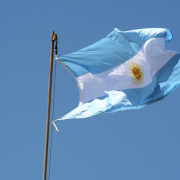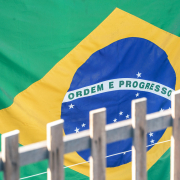The soybean planting is getting off to a slower than average start, but the soybean yields could still be OK if the weather during the growing season is beneficial.
The weather in Brazil showed some improvement last week especially in Mato Grosso where they did start to receive some more scattered showers. They also received rains in far southern Brazil, but in the areas between those two regions, it stayed relatively hot and dry. Many farmers have not yet received enough rainfall to insure good germination and stand establishment.
The forecast for the next 1-2 weeks is dryer especially in central and east-central Brazil where below normal rainfall is expected. So farmers who did not receive enough rain last week to start planting their soybeans, will have to wait a while longer. The heavier rains this week are expected in northern Mato Grosso.
Nationwide, the 2019/20 Brazilian soybean crop is 3% planted compared to 9.5% last year. The soybean planting this year is the slowest in 6 years according to AgRural.
Mato Grosso – The Mato Grosso Institute of Agricultural Economics (Imea) reported last Friday that 6.6% of the soybeans in the state had been planted compared to 12.6% last year and 9.1% average. The most advance soybean planting is in the mid-north region where 10% of the soybeans have been planted. The slowest planting is in the northeast region where 1% have been planted.
In the municipality of Lucas do Rio Verde, which is located in central Mato Grosso, the rainfall thus far has been irregular and not heavy enough to convince many farmers to start planting their soybeans. Farmers are cautiously waiting for enough soil moisture to insure germination and stand establishment. Those with irrigation have started to plant. The forecast is less than ideal with reduced chances for rail in mid-October. Some meteorologists are actually forecasting that the rains will not normalize until maybe early in November.
Soybean production costs are higher this year so farmers are extra careful to make sure they plant their soybeans in as good as conditions possible. Production cost are expected to be approximately 50 sacks per hectare (44.4 bu/ac) with the average soybean yield in Mato Grosso expected to be in the range of 52 to 55 sacks per hectare (46.1 to 48.8 bu/ac).
Parana – The Department of Rural Economics in the state of Parana (Deral) reported that 10% of the soybeans had been planted by early last week. The month of October is a good time to plant soybeans in Parana, but if a farmer is planning to plant a second crop of corn, the soybean planting should be completed by about October 15th. Farmers in Parana are hoping for better results than last year when soybean yields were reduced due to a prolonged period of dry weather during pod filling.
Goias – Brazilian farmers in the municipality of Rio Verde, which is located in southwestern Goias, received some rain on September 25th ranging from less than an inch to almost three inches. Those farmers who received the heavier amounts probably have enough soil moisture to now start planting soybeans. Those who received the lessor amounts or no rain at all, will probably have to wait for additional moisture before starting to plant their soybeans.
According to the director Rural Syndicate of Rio Verde, approximately 3% of the intended soybeans in the region have been planted. The ideal planting window for maximum soybean yields in the region will still be open until early in November. As long as the weather during the remainder of the growing season is beneficial, soybeans planted in early November probably have a similar yield potential as soybeans planted in early October.
The farmers who are concerned about the delayed start to soybean planting are those who plan to plant a second crop of corn and especially a second crop of cotton. Any significant delays in the soybean planting could push the corn and cotton planting past their ideal planting windows.
Minas Gerais – Farmers in the state are expected to start planting their soybeans this week or next week. The president of the Soybean & Corn Producers Association of Minas Gerais (Aprsoja/MG) indicated that farmers with irrigation have already started planting, but most of the farmers without irrigation are still waiting for improved soil moisture. The president is advising farmers not to rush their soybean planting because good planting conditions can account for 40% of the success of the crop.
This is somewhat of a delayed start and he feels that the soybean planting might not be completed until November 15th. The delayed soybean planting could impact when the safrinha corn will be planted early next year depending on what soybean maturity is planted. The ideal planting window for safrinha corn in the state closes about February 20th.
Source: Agropages



